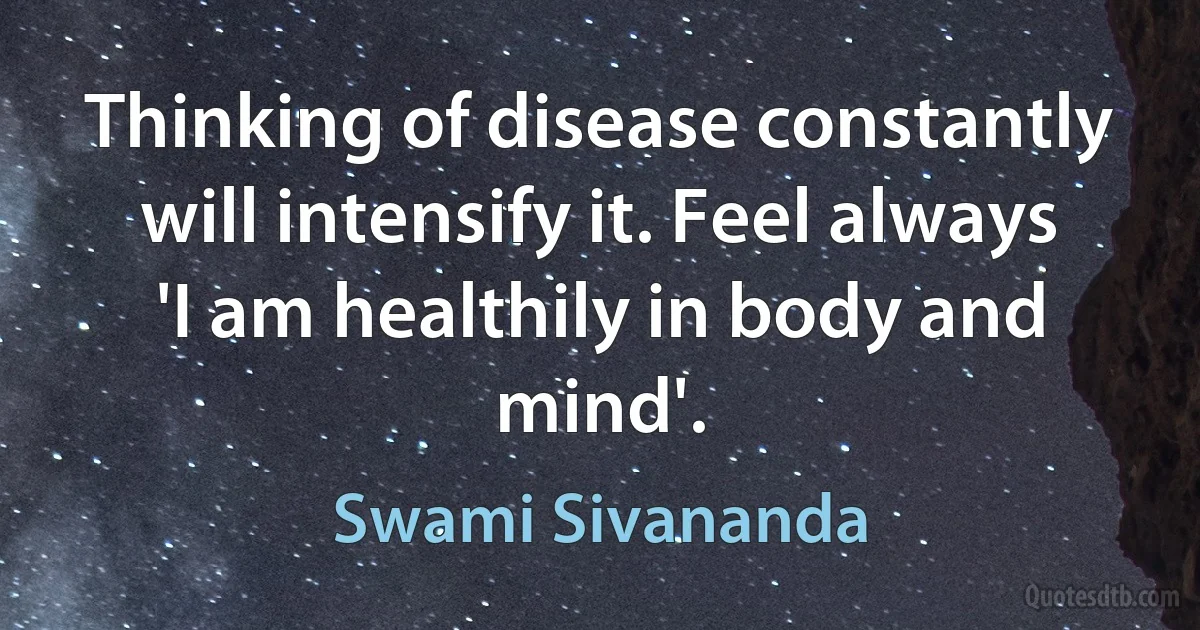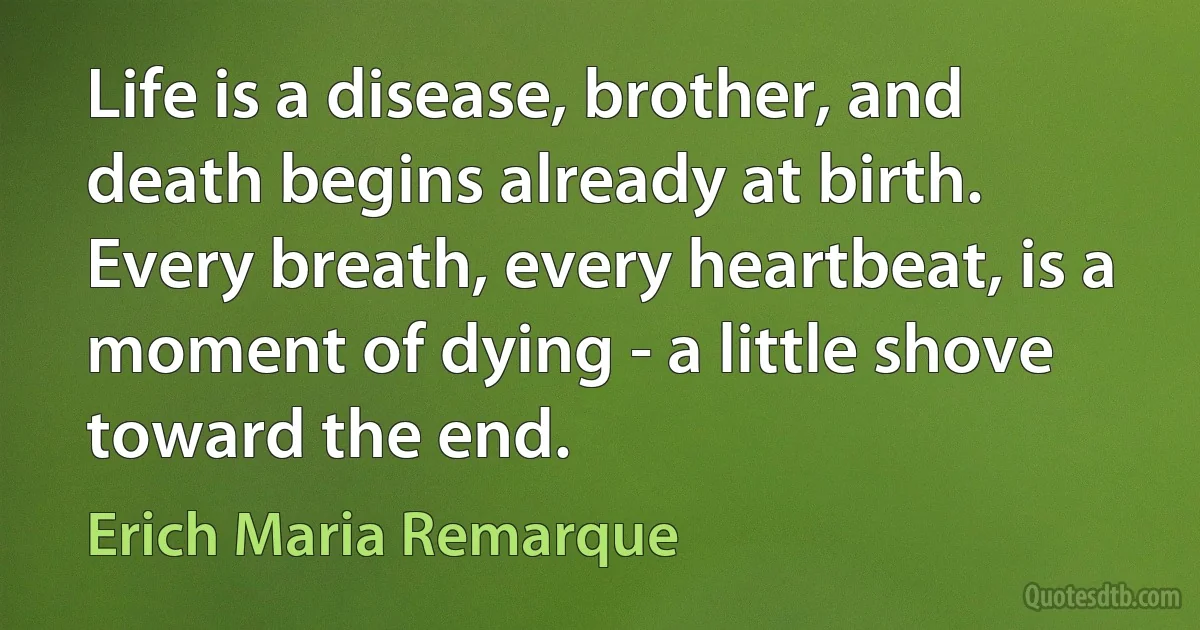Disease Quotes - page 23
At the end of the Middle Ages, leprosy disappeared from the Western world. In the margins of the community, at the gates of cities, there stretched wastelands which sickness had ceased to haunt but had left sterile and long uninhabitable. For centuries is, these reaches would belong to the non-human. From the fourteenth to the seventeenth century, they would wait, soliciting with strange incantations a new incarnation of disease, another grimace of terror, renewed rites of purification and exclusion.

Michel Foucault
The idea that ancient equal years of accumulated wisdom is a fallacy. [...] In medicine, 'ancient' also means developed before we understood the causes of disease, before germ theory. It was based on ignorance then and age makes it no truer. We misguidedly look back to a golden age that never was; ours is the golden age of safe tested medicine, effective beyond placebo, in which we've cut infant mortality and conquered diseases, then forgotten they existed.

Richard Dawkins
When every event was a miracle, when there was no order or system or law, there was no occasion for studying any subject, or being interested in anything excepting a religion which took care of the soul. As man doubted the primitive conceptions about religion, and no longer accepted the literal, miraculous teachings of ancient books, he set himself to understand nature. We no longer cure disease by casting out devils.

Clarence Darrow
Look at Mother Teresa. She spent her whole life being holy. She didn't benefit anyone in any real sense. She didn't work on stopping disease, helping poverty, doing anything that would relieve the condition of her countrymen. She just went around the city, picked up dying people, and took care of them while they died. It was a good thing, no doubt, but it meant no betterment, no progress, no help, no relief from pain. She longed to be holy. She wanted to be a saint. Now she's a saint.
Salk isn't a saint. But he did more for the human race than Mother Teresa did. He didn't long to be holy, which meant having faith, not asking questions, doing something unpleasant without thought or complaint. He longed to do good, which meant finding things out, asking hard questions, and thinking hard, deep thoughts. Goodness and holiness are two different things, unfortunately.

Sheri S. Tepper
Many humans look at nature from an aesthetic perspective and think in terms of biodiversity and the health of ecosystems, but forget that the animals that inhabit these ecosystems are individuals and have their own needs. Disease, starvation, predation, ostracism, and sexual frustration are endemic in so-called healthy ecosystems. The great taboo in the animal rights movement is that most suffering is due to natural causes. Any proposal for remedying this situation is bound to sound utopian, but my dream is that one day the sun will rise on Earth and all sentient creatures will greet the new day with joy.

Nick Bostrom
I am not saying that the events in one life cause the events in another, but that there is an overall pattern - a bank of probable events - and that in each life each individual chooses those that suit his or her overall private purposes. Yet those lives will be connected. An individual may have a serious illness in one life. That event may turn up as one uncomfortable nightmare in another existence. In still another life, the individual might have a dear friend who suffers from the same disease. In still another existence the individual might decide to be a doctor, to seek a cause and a cure for the same disease.

Robert Butts
I may say that Buddhism does indeed come closer in essence to reality than other religions. However, the Buddhist either have not gone far enough, or have gone too far, according to your viewpoint. If they have gone too far, then they have been so concerned with inner reality that they have become too tolerant of physical disease and disasters. If they have no gone far enough, then they have not followed through sufficiently so that these physical disasters could truly be suffered without pain.

Robert Butts
It may also strike you, my readers, as quite shocking when I tell you that there is no such thing, basically, as disease. There are instead only processes. What you think of disease is instead the result of an exaggeration or overextension of perfectly normal body processes. You are not attacked by viruses, for instance, for all kinds of viruses exist normally in the body. There are no KILLER viruses, then but viruses that go beyond their usual bounds.

Robert Butts
They're a migratory tribe, so you find them everywhere [...] They're hardy, longevitous, resistant to infection by disease or new ideas, little modified by regional influences. The accent drifts a bit, maybe. The dialect adapts itself to the local patois: but that's a chameleon's trick: protective colouring, no more. The rest of it, the sinuous mind, the easy passion, the leery eye, the ready smile, the fine, swaggering, billycock-and-shillelagh walk, the flexible moralities, the bel canto oratory, the black bilious angers, these never change.

Morris West
The diseases which are hard to cure in neighborhoods... are catarrh, hoarseness, coughs, pleurisy, consumption, spitting of blood, and all others that are cured not by lowering the system but by building it up. They are hard to cure, first, because they are originally due to chills; secondly, because the patient's system being already exhausted by disease, the air there, which is in constant agitation owing to winds and therefore deteriorated, takes all the sap of life out of their diseased bodies and leaves them more meager every day. On the other hand, a mild, thick air, without drafts and not constantly blowing back and forth, builds up their frames by its unwavering steadiness, and so strengthens and restores people who are afflicted with these diseases.

Vitruvius
Our ancestors, when about to build a town or an army post, sacrificed some of the cattle that were wont to feed on the site proposed and examined their livers. If the livers of the first victims were dark-coloured or abnormal, they sacrificed others, to see whether the fault was due to disease or their food. They never began to build defensive works in a place until after they had made many such trials and satisfied themselves that good water and food had made the liver sound and firm. ...healthfulness being their chief object.

Vitruvius
This test has much in common with the other great challenges that are defining this young century -- from weapons proliferation, to the spread of disease, to transnational terrorism. These are truly global problems, and no one nation, no matter how much power or political will it possesses, can succeed alone. We all need partners, and we all need to work in concert.

Condoleezza Rice
Our foremost priority is the removal of poverty, hunger and malnutrition, disease and illiteracy. All social welfare programmes must be implemented efficiently. Agencies involved in the delivery of services should have a strong sense of duty and work in a transparent, corruption-free, time-bound and accountable manner.

Pratibha Patil



